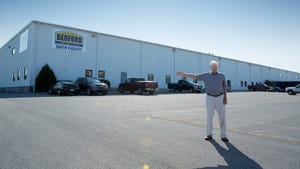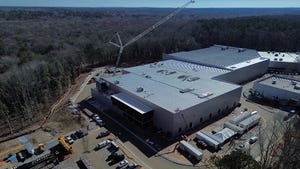- Plastics Processing
- Injection Molding
- Compounding
- Business
- Extrusion: Film & Sheet
- Extrusion: Pipe & Profile
Arburg draws 4100; new machines introduced
May 1, 2008
Arburg draws 4100; new machines introduced
Using the Exjection process/tooling, Arburg’s new vertical machine molded profiles during the firm’s Technology Days event. |
Thousands of injection molders made the trek to Lossburg, Germany in early April to visit the manufacturing facility of injection molding machine manufacturer Arburg, attend presentations on molding, and of course to see the firm’s machines in operation. About 50 presses were running throughout the three-day ’Technology Days’ event, forming everything from thin-walled packaging to automotive parts, thermoset ashtrays, and lengthy profiles.
Michael Hehl, spokesperson for the management team, said Arburg still awaits its final accounting for 2007 but that all indications are that the company passed €400 million in revenue, about a 10% increase over 2006 results. “This didn’t come from price increases,” according to Helmut Heinson, the firm’s sales director, who credits an increased share in a number of markets for the rise.
According to Hehl, electric machines now account for 12% of orders, versus 10% the previous year. The share of orders for the firm’s Golden Edition range of machines rose from 25 to 27%, and the share of larger machines (Arburg’s 630 S to 920 S models) rose from 9 to 14%.
The firm’s leadership was cautious in its prediction for 2008 orders and revenue, noting machine manufacturers have seen a drop in orders in most regions, and Arburg likely will also be affected. Though the total number of injection molding machines sold in North America has dropped significantly, Heinson said Arburg’s sales there have grown as it has grabbed market share; about 40% of the firm’s sales in North America are for all-electric presses.
Among new machines and projects presented during the event, some highlights included a new size for Arburg’s vertical machine range, the Allrounder 375 V, a 50-tonne machine that, at the event, molded profiles using the Exjection process/tooling developed by Austrian toolmaker IB Steiner. The manufacturer also has added a rotary table machine to its Golden Edition range of presses, which come with limited options but offer delivery within a few weeks. During the open house, this new machine processed bottle openers from a leatherfiber-reinforced compound.
Borouge eyeing PO output boost in Middle East
Middle Eastern polyolefins (PO) supplier Borouge (Abu Dhabi, U.A.E.) announced in April during the Dubai Plast Pro 2008 polymer and processing conference in Dubai that it is considering increasing its output beyond the existing plant and trains that are to come onstream in 2010. If the study justifies doing so, the company may bring a new plant online by 2014 with 2.5 million tonnes/yr PO capacity. That would bring total Borouge capacity in the Middle East to 4.5 million tonnes/yr of polyethylene and polypropylene.
Borouge is a joint venture between the Abu Dhabi National Oil Co. (ADNOC) and Borealis A/S (Vienna), one of Europe’s largest polyolefin suppliers. MPW’s Robert Colvin attended the conference.
The Borouge 3 study would develop and supply high-purity low-density polyethylene (LDPE) grades for wire and cable; these are in high demand for growing infrastructure development in the region and in Southeast Asia, says Abdulaziz Abdulla Alhajri, CEO of Abu Dhabi Polymers (Borouge). Also under consideration are ways to increase the company’s competitive position in pipe, packaging, and automotive grades.
The company’s Borouge 2 project, currently under construction and to start up in two years’ time, brings on two polypropylene plants with a total output of 800,000 tonnes/yr along with a PE plant with an annual capacity of 540,000 tonnes/yr. Borouge already has 600,000 tonnes of PE production in operation at Ruwais, U.A.E.
JER Envirotech to expand to South Carolina
Wood-plastic composite (WPC) panel board extruder and compounded pellet supplier JER Envirotech International Corp. (Vancouver, BC) is scouting locations in the Greenville, SC area for a 2008 shift of its joint-venture operation in Malaysia to the U.S. Just before magazine close, Ed Trueman, JER’s president, CEO, and director, told MPW he would go to the area in late April to evaluate greenfield and existing sites for relocation.
“[JER] has an anchor piece of business that compels us to come to that location,” Trueman said, “and we’re going to build out there because logistically it’s a very good place for us to be.” In November 2007, JER announced a four-year supply agreement with Guardian Building Products Distribution Inc. (Greenville, SC) to supply that company with its proprietary WPC pellets. In addition to being a building material distributor, Guardian manufactures a line of light-density fiberglass-insulation products.
Trueman said JER will wind down its Malaysian operation, shifting all its equipment to Greenville, including a twin-screw Entek compounding extruder that will act as the new site’s initial capacity. They company also plans to add more capacity to the new site. In British Columbia, JER operates three custom lines from Entek Extruders for its panel-board product, with two dedicated to compounding WPC pellets.
Middle East capacity will change landscape
More than 1000 attended the 23rd edition of Chemical Market Associates Inc.’s (CMAI; Houston) World Petrochemical Conference in April in Houston, TX. On the agenda was the volatility in the sector and the rapid pace of change, which will accelerate in coming years with massive amounts of capacity set to come online in the Middle East and Asia. “The new Middle East capacity will forever alter trade patterns we’ve seen for years,” explained Nick Vafiadis, business director for polyolefins at CMAI, with Europe likely to be buried in plastics imported from the Middle East, and some of it threatening North America’s position as a net exporter. Tony Potter, director of olefins studies at CMAI for Europe, the Middle East, and Africa, said the Middle East region will add 20 million tons of new ethylene capacity by 2012, more than doubling current capacity, as well as 8.6 million tons of new propylene capacity, representing 38% of global additions in the 2007-2012 timeframe.
At the conference, MPW spoke with Abdullah Saeed Al Darmaki, VP petrochemicals at Abu Dhabi Basic Industries Corp. (ADBIC), which is one of the ongoing projects in the Middle East quest to build new industries around the region’s hydrocarbon resources. Local governments increasingly are interested in keeping plastics pellets in-country and converting them into products headed for export as well as to meet growing domestic demand. ADBIC, a quasi-governmental agency, is setting up a 4.1-km2 “Polymer Park” which will include room for 60 plastics processors, a technical center, and a 350,000m2 business park. Al Darmaki says ADBIC has been very focused in the kinds of companies it wants to attract, signing on nine thus far with an emphasis on items that can be used locally, including pipe, wire and cable, geomembrane films, and rotomolded and blowmolded tanks. The country is a net importer of most plastics goods, and Al Darmaki says that fact, paired with the weakening dollar, has led to double-digit inflation in the country, which is in the midst of a massive construction boom.
MGS Mfg. Group Inc. opens new facility in Mexico
MGS Mfg. Group’s new facility in Chihuahua. |
Injection molder MGS Mfg. Group expanded its manufacturing facilities early this year with the opening of a new location in Chihuahua, Mexico. The operation there, TecStar de Mexico, is an affiliate of TecStar Mfg. Co. (Germantown, WI), which handles medium- to high-volume molding.
With 30 injection molding machines, ranging from 28 to 770 tons, and four additional Negri Bossi presses on the way, as well as an on-site tool shop, TecStar de Mexico molds for the electronics, consumer products, and automotive industries. Secondary operations include sonic welding, pad printing, and manual assembly. The site employs 150 people on three shifts/day, seven days/week.
Clarification: Leadership at injection molding machine maker Engel took exception to a March issue headline, ‘Engel exits Canada,’ for an article on the firm’s closure of its machine manufacturing facility in Ontario. The company still operates a sales, service, spare parts and technology center to support the Canadian market, with more than 40 employees there.
Erratum: In the February 2008 issue, pg. 22, the wrong acronym (PAI) was used in reference to Solvay AP’s Ixef BXT-2000, a polyarylamide. In the same article we stated that Solvay proposes a two- or three-layer design for barrier consisting of EVOH and its Ixef material. In actuality, the Ixef replaces the EVOH.
Engel installs giant machine
Graf’s new machine is no small presence. |
Plastics processor Graf (Teningen, Germany), which makes and markets its own line of rainwater containers and other large tanks, has installed a two-platen, 55,000 kN (5500 tonnes) machine with three injection units, made by injection molding machine manufacturer Engel (Schwertberg, Austria), for the production of underground tanks and logistics containers. The duo 5500 supports shot weights of up to 140 kg with its three injection units.
The 25m-long injection molding machine has a total weight of 585 tonnes, with another 160 tonnes for the mold it runs. Despite its great size, Engel says it is gentle on the energy budget, with a specific energy consumption of just 0.34 kWh/kg under production conditions.
You May Also Like


